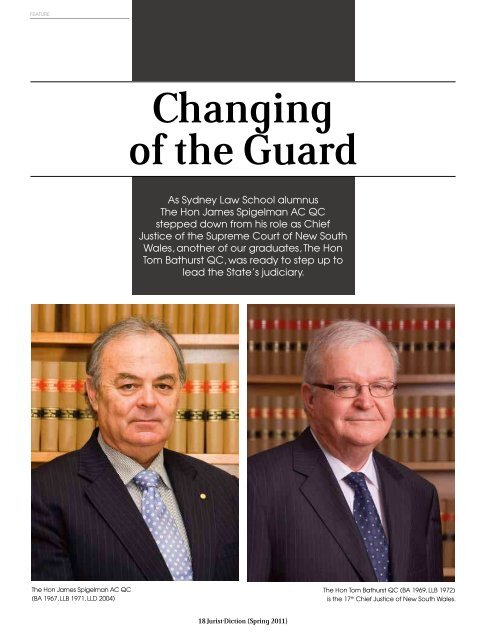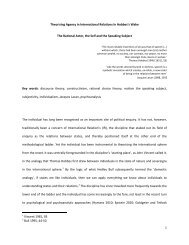gLoBAL energy And reSourceS LAw - The University of Sydney
gLoBAL energy And reSourceS LAw - The University of Sydney
gLoBAL energy And reSourceS LAw - The University of Sydney
You also want an ePaper? Increase the reach of your titles
YUMPU automatically turns print PDFs into web optimized ePapers that Google loves.
feAture<br />
the hon James Spigelman Ac Qc<br />
(BA 1967, LLB 1971, LLd 2004)<br />
Changing<br />
<strong>of</strong> the Guard<br />
As <strong>Sydney</strong> Law School alumnus<br />
the hon James Spigelman Ac Qc<br />
stepped down from his role as chief<br />
Justice <strong>of</strong> the Supreme court <strong>of</strong> new South<br />
wales, another <strong>of</strong> our graduates, the hon<br />
tom Bathurst Qc, was ready to step up to<br />
lead the State’s judiciary.<br />
the hon tom Bathurst Qc (BA 1969, LLB 1972)<br />
is the 17 th chief Justice <strong>of</strong> new South wales.<br />
A<br />
number <strong>of</strong> years ago, the Hon J P Slattery delivered a<br />
compelling speech on Sir Frederick Jordan, for whom he<br />
had been Associate. Like Spigelman CJ, Sir Frederick was<br />
one <strong>of</strong> the country’s greatest jurists to not be appointed to the<br />
High Court.<br />
That speech enjoyed one very great advantage over this<br />
short note: its subject is no longer around to point out the<br />
misrepresentations.<br />
<strong>The</strong> law was not the first occupation in which Spigelman<br />
CJ practised. His time as principal private secretary to Gough<br />
Whitlam and, subsequently, head <strong>of</strong> the Department <strong>of</strong> Media,<br />
are well known. As indeed are his early books on matters <strong>of</strong> high<br />
public policy. He graduated from <strong>Sydney</strong> Law School in 1971,<br />
winning the <strong>University</strong> Medal, and published his first book<br />
Secrecy: Political Censorship in Australia the following year, and<br />
his second (with Peter Pringle), <strong>The</strong> Nuclear Barons in 1981.<br />
His coming to the Bar in 1976 was a great loss for the<br />
Commonwealth Government, though <strong>of</strong> course, a terrific gain<br />
for the law. It took a mere 10 years for him to be appointed<br />
Queen’s Counsel, followed by an appointment to the Bench<br />
some 12 years later.<br />
As a judge, his juristic talent was most evident in his<br />
understanding <strong>of</strong> the broad sweep and direction <strong>of</strong> the law. In<br />
the detail <strong>of</strong> his matters, he saw an explication <strong>of</strong> the subsequent<br />
case, and then the following one. <strong>The</strong>re are few as adept as he at<br />
identifying the momentum <strong>of</strong> the law, and, indeed, in shifting its<br />
course. When he was crafting a judgment (the word craft being<br />
apt to describe a process involving a great many drafts), he was<br />
enlivened by those cases which called for an appreciation <strong>of</strong> context.<br />
T<br />
he Hon Tom Bathurst QC was born in England but<br />
moved to <strong>Sydney</strong> as a young boy. It is fortunate that<br />
Australia can call the Bathurst family its own: not only<br />
did the family produce a Chief Justice, but his mother, Joan,<br />
was a champion tennis player who won the Australian Open<br />
three times and was a semi-finalist at Wimbledon on two<br />
occasions.<br />
Chief Justice Bathurst was educated at St Ignatius College<br />
before studying law at <strong>Sydney</strong> Law School, where he excelled<br />
in commercial law subjects.<br />
He was admitted as a solicitor in 1972 and commenced his<br />
pr<strong>of</strong>essional life with E J Ernest Kirby & Co. He claims that<br />
he was never a particularly good solicitor, and said as much at<br />
his swearing in as Chief Justice. His supervisors say otherwise.<br />
By all accounts he was extremely talented and so dedicated to<br />
his work that he spent his 21st birthday running a matter from<br />
Papua New Guinea rather than celebrating with friends.<br />
Throughout his career in the<br />
legal pr<strong>of</strong>ession Bathurst CJ has<br />
been a formidable leader and a<br />
generous mentor.<br />
18 Jurist·Diction {Spring 2011} Jurist·Diction {Spring 2011} 19<br />
Beyond his casework, his knowledge <strong>of</strong> public administration<br />
led him to propose a number <strong>of</strong> significant changes to the<br />
listing and hearing practices <strong>of</strong> the Court. In doing so, he<br />
revealed great fortitude — the track-record <strong>of</strong> those seeking to<br />
improve the timeliness and decrease the cost <strong>of</strong> litigation is not<br />
good. <strong>The</strong> comparative ease with which Spigelman CJ was able<br />
to implement his changes is testament to the very great esteem<br />
with which the judicial <strong>of</strong>ficers and administrative staff <strong>of</strong> the<br />
court held him.<br />
Ironically, given his published aversion to performance<br />
measurement, it is possible to see the record <strong>of</strong> his success in<br />
the Supreme Court’s ‘Key Performance Indicators’. It is no<br />
longer the case that young litigants grow old while waiting for<br />
a hearing date.<br />
He saw the global engagement <strong>of</strong> the legal pr<strong>of</strong>ession as<br />
vital. <strong>The</strong> judicial exchange programs that he developed,<br />
particularly with regards to the judiciary <strong>of</strong> China, and the<br />
agreements he reached with foreign courts as regards judicial<br />
exchange and the certification <strong>of</strong> question <strong>of</strong> foreign law, have<br />
put the NSW Supreme Court in a leading position within the<br />
region.<br />
His recent appointment to lead an inquiry into the<br />
constitutional recognition <strong>of</strong> local government, together with<br />
his leadership <strong>of</strong> major national institutions like the National<br />
Library, make clear that his retirement will not diminish his<br />
continued contribution.<br />
Samuel McSkimming is a lawyer at Gilbert + Tobin, and a<br />
former researcher to Spigelman CJ.<br />
Chief Justice Bathurst was called to the bar in 1977. He<br />
took silk 10 years later. Some <strong>of</strong> the more famous cases he<br />
appeared in include the C7 case, the Sons <strong>of</strong> Gwalia case, the<br />
Bell Group litigation and the James Hardie litigation. As a<br />
barrister, he became known for his incredible ability to digest a<br />
large and diverse sum <strong>of</strong> information quickly, reduce multiple<br />
ideas into a set <strong>of</strong> key propositions, and outline his case to the<br />
court clearly and succinctly.<br />
Throughout his career in the legal pr<strong>of</strong>ession Bathurst CJ<br />
has been a formidable leader and a generous mentor. He was<br />
President <strong>of</strong> the Bar Association from 2008 to 2010, during<br />
which time he led the pr<strong>of</strong>ession with distinction and served<br />
as a mentor to many young barristers. In his early days on<br />
the court he has demonstrated a commitment to collegiality,<br />
ensuring that the Supreme Court <strong>of</strong> NSW is a wonderful place<br />
to work.<br />
In his spare time, Bathurst CJ barracks for the New South<br />
Wales Waratahs, swims, plays tennis and enjoys the opera.<br />
He has an excellent sense <strong>of</strong> humour and is widely loved<br />
and constantly praised by the barristers, and baristas, <strong>of</strong><br />
Phillip Street.<br />
Claudia Newman-Martin is Research Director to the<br />
Chambers <strong>of</strong> the Chief Justice <strong>of</strong> New South Wales.<br />
feAture

















